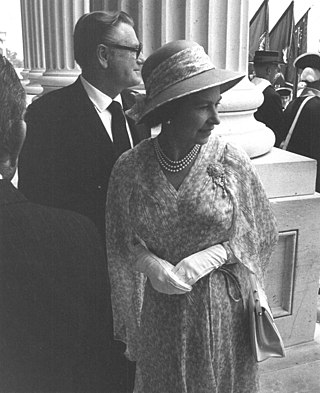Related Research Articles

Edward Gough Whitlam was the 21st prime minister of Australia, serving from 1972 to 1975. The longest-serving federal leader of the Australian Labor Party (ALP) from 1967 to 1977, he was notable for being the head of a reformist and socially progressive administration that extraordinarily ended with his removal as prime minister after controversially being dismissed by the governor-general of Australia, Sir John Kerr, at the climax of the 1975 Australian constitutional crisis. Whitlam is the only Australian prime minister to have been removed from office.

The Australian Secret Intelligence Service is the foreign intelligence agency of Australia, tasked with the covert collection of information overseas through personal contacts and other means of human intelligence. It is part of the Australian Intelligence Community and is also responsible for counter-intelligence and liaising with the intelligence agencies of other countries. ASIS was formed in 1952 but its existence remained secret within much of the government until 1972. ASIS is comparable to the American CIA and the British MI6.
Paul John Kelly is an Australian political journalist, author and television and radio commentator from Sydney. He has worked in a variety of roles, principally for The Australian newspaper, and is currently its editor-at-large. Kelly also appears as a commentator on Sky News and has written seven books on political events in Australia since the 1970s including on the 1975 Australian constitutional crisis. Recent works include, The March of Patriots, which chronicles the creation of a modern Australia during the 1991–2007 era of Prime Ministers, Paul Keating and John Howard, and Triumph & Demise which focuses on the leadership tensions at the heart of the Rudd-Gillard Labor Governments of 2007–2011. Kelly presented the Australian Broadcasting Corporation (ABC) TV documentary series, 100 Years – The Australian Story (2001) and wrote a book of the same title.

The 1975 Australian constitutional crisis, also known simply as the Dismissal, culminated on 11 November 1975 with the dismissal from office of the prime minister, Gough Whitlam of the Australian Labor Party (ALP), by Governor-General Sir John Kerr, who then commissioned the leader of the Opposition, Malcolm Fraser of the Liberal Party, as prime minister. It has been described as the greatest political and constitutional crisis in Australian history.

Sir John Robert Kerr was an Australian barrister and judge who served as the 18th Governor-General of Australia, in office from 1974 to 1977. He is primarily known for his involvement in the 1975 constitutional crisis, which culminated in his decision to dismiss the incumbent prime minister Gough Whitlam and appoint Malcolm Fraser as his replacement, unprecedented actions in Australian federal politics.

James Ford Cairns was an Australian politician who was prominent in the Labor movement through the 1960s and 1970s, and was briefly Treasurer and Deputy Prime Minister in the Whitlam government. He is best remembered as a leader of the movement against Australian involvement in the Vietnam War, for his affair with Junie Morosi and for his later renunciation of conventional politics. He was also an economist, and a prolific writer on economic and social issues, many of them self-published and self-marketed at stalls he ran across Australia after his retirement.

Sir Paul Meernaa Caedwalla Hasluck, was an Australian statesman who served as the 17th Governor-General of Australia, in office from 1969 to 1974. Prior to that, he was a Liberal Party politician, holding ministerial office continuously from 1951 to 1969.

Francis Daniel Crean was an Australian politician who served as a member of the House of Representatives from 1951 to 1977, representing the Labor Party. He was a minister in the Whitlam Government, including as Treasurer from 1972 to 1974 and Deputy Prime Minister for a few months in 1975.
Sir David Iser Smith was an Australian public servant. He was the Official Secretary to the Governor-General of Australia between 1973 and 1990, in which capacity he served Sir Paul Hasluck, Sir John Kerr, Sir Zelman Cowen, Sir Ninian Stephen and Bill Hayden.

Christopher John Boyce is a former American defense industry employee who was convicted of selling United States spy satellite secrets to the Soviet Union in the 1970s.
The Loans affair, also called the Khemlani affair, was a political scandal involving the Whitlam government of Australia in 1975 in which it was accused of attempting to borrow money from the Middle East by the agency of the Pakistani banker Tirath Khemlani and thus bypass the standard procedures of the Australian Treasury and violate the Australian Constitution.

Reginald Francis Xavier "Rex" Connor was an Australian politician who served as a member of the House of Representatives from 1963 to his death, representing the Labor Party. He was the Minister for Minerals and Energy in the Whitlam Government from 1972 to 1975.

The Whitlam government was the federal executive government of Australia led by Prime Minister Gough Whitlam of the Australian Labor Party. The government commenced when Labor defeated the McMahon Government at the 1972 federal election, ending a record 23 years of continuous Coalition government. It was terminated by Governor-General Sir John Kerr following the 1975 constitutional crisis and was succeeded by the Fraser Government—the sole occasion in Australian history when an elected federal government was dismissed by the head of state.
The Dismissal is an Australian television miniseries, first screened in 1983, that dramatised the events of the 1975 Australian constitutional crisis.

Jennifer Jane Hocking is an Australian historian, political scientist and biographer. She is the inaugural Distinguished Whitlam Fellow with the Whitlam Institute at Western Sydney University, Emeritus Professor at Monash University, and former Director of the National Centre for Australian Studies at Monash University. Her work is in two key areas, counter-terrorism and Australian political biography. In both areas she explores Australian democratic practice, the relationship between the arms of government, and aspects of Australian political history. Her research into the life of former Australian prime minister Gough Whitlam uncovered significant new material on the role of High Court justice Sir Anthony Mason in the dismissal of the Whitlam government. This has been described as "a discovery of historical importance". Since 2001 Hocking has been a member of the Board of Trustees of the Lionel Murphy Foundation.

The Fraser government was the federal executive government of Australia led by Prime Minister Malcolm Fraser. It was made up of members of a Liberal-Country party coalition in the Australian Parliament from November 1975 to March 1983. Initially appointed as a caretaker government following the dismissal of the Whitlam government, Fraser won in a landslide at the resulting 1975 Australian federal election, and won substantial majorities at the subsequent 1977 and 1980 elections, before losing to the Bob Hawke-led Australian Labor Party in the 1983 election.

Antidote Films is a Brisbane-based independent film distributor, formerly known as Gil Scrine Films, specialising in arthouse films and social documentaries. Established in 1973 as a vehicle for distributing the documentaries of Gil Scrine, today the company is the Australian distributor for award winning films from all over the world.
William Thomas Robertson was the fourth Director-General of the Australian Secret Intelligence Service (ASIS), from 1968 until 1975, when was dismissed by Prime Minister Gough Whitlam; the reasons for Roberton's dismissal have remained a matter of controversy.

The Palace letters, sometimes labelled as the Palace papers, were letters between Queen Elizabeth, through her Private Secretary Martin Charteris, and Australian Governor-General Sir John Kerr around the time of the 1975 constitutional crisis, in which Kerr dismissed Australian Prime Minister Gough Whitlam. The phrase 'Palace letters' originated in the work of Australian historian and Whitlam biographer Professor Jenny Hocking, who successfully overturned the Queen's embargo over these letters, as a reference to Buckingham Palace, the official residence of Queen Elizabeth in London.
CIA involvement was alleged in the Whitlam dismissal in Australia in 1975. The Australian Prime Minister Gough Whitlam and his government were removed by the Governor-General Sir John Kerr as a culmination of the 1975 Australian constitutional crisis. Whitlam and his supporters maintained that the CIA encouraged or was otherwise involved in the Dismissal because it saw Whitlam as a threat to the US intelligence relationship with Australia.
References
- ↑ "Exits (1980)".
- ↑ http://wwwmcc.murdoch.edu.au/readingroom/serial/AJCS/1.2/Cunningham.html "The only filmic treatments of the events of 11 November 1975, Exits (Paul Davies, Pat Laughren, Carolyn Howard, 1979) and Home on the Range (Gil Scrine, 1982) circulate marginally as independent 'political' films, each with tangential, though significant, modes of intersection with the politics of the dismissal. Exits situates Whitlam's dismissal in terms of its existential impact on the lives of 'ordinary' people undergoing their own relational and vocational 'exits', juxtaposed somewhat incoherently, or, to gloss it positively, 'experimentally', with rhetorical gestures toward CIA involvement in the dismissal. Home on the Range does more than gesture toward such CIA intervention, indeed, it marshals a persuasive array of evidence linking the imminent expiry of leases on U. S. military and intelligence bases in Australia in 1975, the CIA, and Whitlam's dismissal. Comparing this analysis and what is offered in The Dismissal on the CIA is instructive.